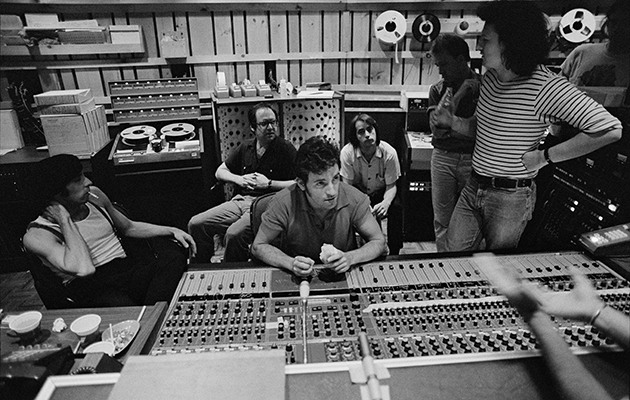Only the insatiable Bruce Springsteen, you feel, could record a sprawling double album that would one day prove to be merely the tip of the iceberg. Released in October 1980, unlike its predecessor, the finely wrought Darkness On The Edge Of Town, The River made no attempt to sustain a mood or hold to a narrative through-line: the only story it tells is of Springsteen’s sheer prolificacy. Even today, it’s the album that comes closest to mapping the contours of his live show. Mixing carefree rockers, soulful testifying and solemn moments of contemplation, The River’s 20 tracks move from deep shade (the title track, “Stolen Car”, “Drive All Night”, “Independence Day”) to knockabout romps such as “Ramrod”, “I’m A Rocker” and “Crush On You”.
All of which begs the question: do we need a hefty addendum to an album that already boasts its fair share of sidebars and diversions? Yes and no. This is a weighty document. As well as four discs featuring 52 tracks of audio material, The Ties That Bind includes a double-DVD film shot in 1980 at a concert in Tempe, Arizona, plus rehearsal footage and an hour-long documentary. There is also a 120-page coffee-table book.
Inevitably, not all of it is essential, but it helps immeasurably that The Ties That Bind is smartly thought out, and structured in such a way that allows three distinct records to emerge from the one that already exists. Heard alongside Springsteen’s considerable marginalia, the original version of The River – which takes up two of the four CDs – is subtly reshaped. The third disc comprises the first official release of The River: Single Album, much bootlegged and better known among aficionados as The Ties That Bind. This is the album that Springsteen completed in 1979 as the intended follow-up to Darkness On The Edge Of Town, and which he eventually scrapped because he felt it lacked unity. He was wrong. It holds together very well indeed.
Seven of the 10 songs eventually appeared on The River. Some survived essentially unchanged, others feature alternate lyrics and notable shifts of mood and emphasis. “The Price You Pay” runs to six minutes and includes an extra verse, and there’s a fine, razor-edged rockabilly version of “You Can Look (But You Better Not Touch)”, on which Springsteen channels Jerry Lee. Of the three songs ultimately dropped from The River, the unremarkable “Be True” and terrific “Loose Ends” ended up on Tracks, while the unreleased “Cindy” is a pretty, Buddy Holly-ish strum recounting a mismatched love affair.
The big reveal comes on the final disc of outtakes, comprising 22 tracks recorded in 1979 and 1980. Half of these were previously released on the Tracks boxset and Essentials album, but they speak more clearly returned to their original context. The extent to which Springsteen was being influenced by punk and new wave is evident on “DollHouse”, “Living On The Edge Of The World” – two parts Clash to one part Costello and the Attractions – “Where The Bands Are” and the messy, urgent “Held Up Without A Gun”.
The remaining 11 outtakes are unreleased rarities, some of which have remained off the radar of even the most dedicated bootlegger. They’re a mixed bag, yet even the slightest numbers have an exuberant appeal. Many are essentially genre studies. On “Little White Lies” the Boss does polka, complete with Cossack cries of “hoy!”, “Chain Lightning” is a rowdy rumble, Duane Eddy’s “Peter Gunn” hopped up on moonshine and shackled to spooky organ. “Party Lights” uses The Byrds’ “Feel A Whole Lot Better” as the starting point for a more downbeat exploration of the life of the working single mother who appeared in “I Wanna Marry You”.
It’s a fine thing to finally hear the studio version of “Paradise By The C”, the joyous soul instrumental until now only available on Live 1975-85, while “Mr. Outside” is a pleasingly ramshackle solo busk, bringing all this scattershot creativity back to the founding spark of creation. But these are, essentially, trifles. Occasionally, however, The Ties That Bind throws up a song that renders Springsteen’s decision to cast it into the wilderness all but inexplicable. “The Man Who Got Away” is a thumping potboiler, blurring the lines between cinematic derring-do and real-life transgressions. Better still are “Night Fire”, “The Time That Never Was” and “Stray Bullet”. These are A-grade Springsteen, fully realised, broiling with atmosphere and emotional heft.
So what are we left with? A handful of wonderful “new” songs, some interesting also-rans and alternative choices, and the sobering realisation that, in 1980, Springsteen could have released an entirely different double album from The River: a work not quite of equal quality, but still of a remarkably high standard.
Uncut: the spiritual home of great rock music.


